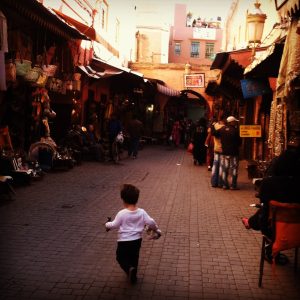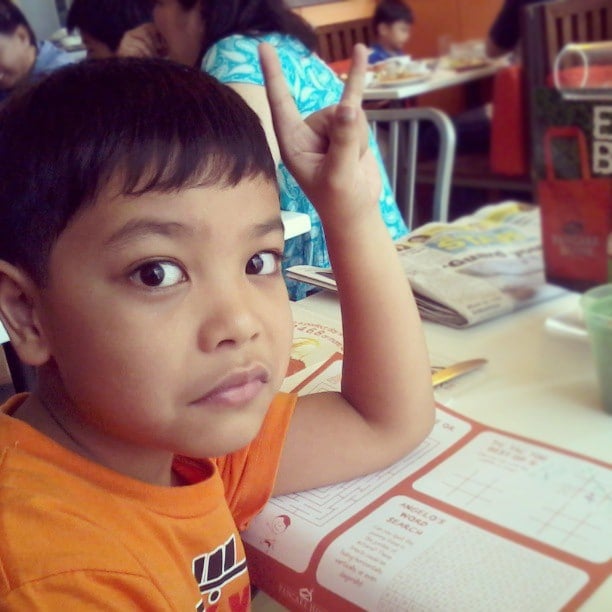by Natalia Rankine-Galloway (Morocco) | May 29, 2013 | Childhood, Economy, Expat Life, Eye on Culture, Humanity, Morocco, Parenting, Poverty, Travel
 My mom loves to tell stories about her girls…to anyone who will listen. One of her favorites is about my first plane ride home from her native Peru. At age 6, as I sat in the window seat watching Lima fade away beneath us, I turned to her and said (with wisdom far beyond my years my mum will add) “the trouble with Peru is that the Peruvians don’t take good care of it.”
My mom loves to tell stories about her girls…to anyone who will listen. One of her favorites is about my first plane ride home from her native Peru. At age 6, as I sat in the window seat watching Lima fade away beneath us, I turned to her and said (with wisdom far beyond my years my mum will add) “the trouble with Peru is that the Peruvians don’t take good care of it.”
Admittedly it is one of her less embarrassing stories, better by far than the one that has me passing most of a Greek holiday with a potty on my head. And lately, as my son gets older, I’ve been thinking more about it.
By the time we leave Morocco this fall, he will not quite be three. Throughout our time here, that fact made me sad. There is likely little if anything that he will remember about our year in Morocco and our travels in North Africa. But now, this has also made me slightly grateful.
I have started to see the cogs turning in his little head when we pass the women begging on the street, with toddlers his age strapped to their backs. I see him watching the kids selling cartons of tissues at the stop lights as I guiltily roll up the window.
As his little eyes observe more and more I am starting to be glad that we will leave before the questions start. He hasn’t progressed much past the basic two-word toddler interrogatives: dada gone? more biscuit? But I am imagining the questions forming, and I need more time to come up with good answers.
When he asks me about these babies on their mothers backs, or the ones selling on streets, what do I say? Moreover, how do you explain your own role in the perpetuation of this inequality. How do I explain that being asked for the 19th time in one day to spare just 1 dirham irritates me more and more in spite of the fact that had I given one each time, I would now be short only $2? How would I explain that the shoes he’s wearing would cover our gardeners weekly salary?
Observant though I might have been at age 6 about the socio-economics of Peru, it did not give me any head start on figuring out any actionable recommendations for the Peruvians about how to improve their problems of poverty, inequality, pollution. Nor do I have any for Morocco now, some 25 years later.
I am a big believer in my own and my son’s capacity to save the world. I take part in fundraising campaigns, donate to charity and volunteer. I will always encourage him to live a life of tolerance, patience and understanding. But when you live in the midst of an unequal society – to what extent are you compromising your principles by continuing to live in the manner to which you are accustomed?
So while I doubt that I will ever come up with any Nobel Peace prize winning solutions to global income inequality myself, I would at the very least time to come up with a way of explaining poverty to my son. I would like to be able to explain to him that he is lucky without teaching him conceit or entitlement. I would like to teach him that our relative wealth comes with a responsibility to those less fortunate in such a way that empowers and doesn’t leave me stinking of rank hypocrisy when I look away from the outstretched hands on the street.
How do you teach your children about income inequality when you are living on the “have” side of an unequal society?
This is an original post to World Moms Blog by our contributor, Natalia Rankine-Galloway, who writes at The Culture Mum Chronicles. She is now writing from the U.S. Embassy in Morocco.
Photo credit to the author.

Natalia was born a stone's throw from the Queen's racetrack in Ascot, UK and has been trying to get a ticket to the races and a fabulous hat to go with it ever since. She was born to a Peruvian mother and an Irish father who kept her on her toes, moving her to Spain, Ireland and back to the UK before settling her in New York for the length of middle and high school. She is still uncertain of what she did to deserve that.
She fled to Boston for college and then Washington, D.C. to marry her wonderful husband, who she met in her freshman year at college. As a military man, he was able to keep her in the migratory lifestyle to which she had become accustomed. Within 5 months of marriage, they were off to Japan where they stayed for a wonderful 2 and one half years before coming home to roost. Baby Xavier was born in New York in 2011 and has not slept since.
A joy and an inspiration, it was Xavier who moved Natalia to entrepreneurship and the launch of CultureBaby. She has loved forging her own path and is excited for the next step for her family and CultureBaby.
Natalia believes in the potential for peace that all children carry within them and the importance of raising them as global citizens. She loves language, history, art and culture as well as Vietnamese Pho, Argentinian Malbec, English winters, Spanish summers and Japanese department stores...and she still hopes one day to catch the number 9 race with Queen Liz.
You can find her personal blog, The Culture Mum Chronicles.
More Posts

by Salma (Canada) | May 24, 2013 | Bilingual, Canada, Communication, Culture, Education, Family, Kids, Language, Motherhood, Multicultural, Parenting, Salma, World Motherhood, Younger Children

I am trying to teach my youngest child three languages. I am determined to make it work, even if I only speak one perfectly. I am making a conscious decision to do something that is almost as awful as pulling teeth (in my opinion). I am determined to force myself to come out of my comfort zone, even if it means being laughed at; yes, it happens sometimes. My attempts to teach my young child English, Arabic and French were inevitably a disaster waiting to happen, except that it happened right away. It is a deliberate act of madness on my part, and I hope that my son makes it out alive.
Here’s a little background on my adventures. I have always been a passive bilingual. In my case, I understand spoken French (mostly), I understand written French (greatly), and I can speak some French. The problem is, as the years go by, my linguistic ability coupled with my self-confidence dwindles. And boy is it ever complicated! Along with my love for French, I found it necessary to study and learn Arabic – I married an Arabic speaker. Sure, he speaks English, but my mother-in-law doesn’t speak more than ten words of English.
Learning a new language in your late 20’s is something different. I have always respected immigrants who move to new countries and learn the language (through no choice of their own of course), but now I respect them ten-fold. (more…)

An Imperfect Stepford Wife is what Salma describes herself as because she simply cannot get it right. She loves decorating, travelling, parenting,learning, writing, reading and cooking, She also delights in all things mischievous, simply because it drives her hubby crazy.
Salma has 2 daughters and a baby boy. The death of her first son in 2009 was very difficult, however, after the birth of her Rainbow baby in 2010 (one day after her birthday) she has made a commitment to laugh more and channel the innocence of youth through her children. She has blogged about her loss, her pregnancy with Rainbow, and Islamic life.
After relocating to Alberta with her husband in 2011 she has found new challenges and rewards- like buying their first house, and finding a rewarding career.
Her roots are tied to Jamaica, while her hubby is from Yemen. Their routes, however, have led them to Egypt and Canada, which is most interesting because their lives are filled with cultural and language barriers. Even though she earned a degree in Criminology, Salma's true passion is Social Work. She truly appreciates the beauty of the human race. She writes critical essays on topics such as feminism and the law, cultural relativity and the role of women in Islam and "the veil".
Salma works full-time, however, she believes that unless the imagination of a child is nourished, it will go to waste. She follows the philosophy of un-schooling and always finds time to teach and explore with her children. From this stance, she pushes her children to be passionate about every aspect of life, and to strive to be life-long learners and teachers. You can read about her at Chasing Rainbow.
More Posts - Website

by hjunderway | May 20, 2013 | Being Thankful, Child Care, Childhood, Cultural Differences, Education, Expat Life, Family, France, International, Language, Life Lesson, Living Abroad, Motherhood, Multicultural, Parenting, Preschool, Relocating, World Motherhood, Younger Children
 Looking back to my pregnancy as an almost mom to my one and only son, I literally had everything prepared for the first nine months of his life before his eyes ever saw the outside world.
Looking back to my pregnancy as an almost mom to my one and only son, I literally had everything prepared for the first nine months of his life before his eyes ever saw the outside world.
Diapers and clothing gently washed and neatly lined up by size, ready for each growth spurt, each passage from newborn to infant and beyond. I bought “What to Expect….” for the first three years of his existence, pouring over every detail and mentally preparing myself for each developmental stage. I was ready for it all.
My planning served me well for the first three years of my son’s life, and then we up and decided to move to a foreign country. The “What to Expect” books were packed away in long-term storage in the United States, and along with it, my sense of direction as a mother.
We have spent the last year attempting to navigate our way through life in France when French isn’t your primary language, when there aren’t any grandparents to lend a hand, and when all that is familiar becomes a distant dream.
When we arrived in France, my son was 2 years, five months and together we plowed through understanding new social norms, French cuisine, and more recently, the education system.
We did this without a manual, and did okay without it. There were times when I just wanted to type in “raising an American boy in Paris” in Google to look for tips and clarity on what we were doing wrong (or right). If there had been a manual or how-to book, I would have read it 1,000 times and given copies to all of my new expatriate friends with children.
I wasn’t sure that we were doing right by our son when we entered him into a French school at age three (standard practice in France), when the teachers and students couldn’t even pronounce his name correctly. I wasn’t sure that we were doing it right when potty training took a huge deviation and we faced mounting laundry that took forever to dry on racks in our living room.
I know I wasn’t sure that we had done right by our son when he had a meltdown at a friend’s playgroup,hitting and kicking anyone and everyone who came into his path. When I had to pack him up early and head home, I may have had a meltdown myself. Again and again, I was looking for grand gestures in my son’s behavior as proof that he was adjusting appropriately to living in a new country, and I couldn’t find any.
Why do we always look for the grand gestures? Without a guide, we often get caught up looking for the big things and forgetting to spot the small ones.
For example, at 6 months of age, I knew that my son wasn’t able to crawl because he hadn’t developed enough upper body strength to support his head, which was off the charts developmentally. I knew this because the books and doctors told me so, and therefore I had an appropriate course of action to get him back on track. Having a guide instilled in me a parenting confidence that I knew my son and that we were doing everything right, but by whose standards?
Now, a year later and closer to preschool age than that of toddler, I find myself discovering more and more of the small indications that my little one is doing just fine transitioning in our new life abroad. I see it when my son doesn’t realize I’m watching and instead of saying, “Look, look!” with excitement, he yells out, “Regarde, regarde!” (Look in French.)
I see it when he stops to hug a strange toddler crying in the playground, or when he asks me if we can take an airplane home to see his grandparents and cousin. I see it when he takes my hand to cross the street but instead of letting go immediately, he gently slides his thumb repeatedly across my knuckles, something I’ve done to him a thousand times. As time goes on, he becomes more and more self-assured and more at home being who he is. And no manual could have prepared me for that.
Has there been a time when a manual or how-to book couldn’t help you effectively parent your child through a unique situation?
This is an original post to World Moms Blog by Jacki, an American expatriate mother living in Paris, France.
The image used in this post is credited to the author
Jacki, or “MommaExpat,” as she’s known in the Internet community, is a former family therapist turned stay-at-home mom in Paris, France. Jacki is passionate about issues as they relate to mothers and children on both domestic and international scenes, and is a Volunteer Ambassador for the Fistula Foundation. In addition to training for her first half marathon, Jacki can be found learning French in Paris and researching her next big trip. Jacki blogs at H J Underway, a chronicle of her daily life as a non-French speaking mom in France.
More Posts

by Wall Street Mama (USA) | May 17, 2013 | Child Care, Family, Health, Home, Husband, Kids, Life Balance, Motherhood, Parenting, Working Mother, World Motherhood, Younger Children

I made my first guest contribution to the World Moms Blog about two years ago. My article focused on being a “busy bee,” and managing working, motherhood and household duties. I wrote about energy, dedication to my career and “getting it all done,” even though I knew the workload was hard. At that point in time, my son had just turned one. Well, flash forward to 2013 and my son will be three in a few weeks and my daughter will be one in two months. There is only one word that comes to mind – Exhaustion! (more…)

Wall Street Mama was born and raised in the suburbs of Chicago and moved to NJ when she was a teenager. She fell in love with New York City and set her mind to one thing after college – working on Wall Street. She has spent the last 16 years working on the trading floor at three major banks. As an Institutional Salesperson, she is responsible for helping large corporations and money funds invest their short term cash in the fixed income part of the market. She lives in the suburbs of central NJ with her husband of 11 years, their amazing 21 month old boy and their first baby – a very spoiled Maltese. She has baby #2 on the way and is expecting a little girl in June 2012. She is a full time working mother and struggles with “having it all” while wondering if that is even possible.
Wall Street Mama was married at the age of 25 but waited to have children because she felt she was too focused on her career which required a lot of traveling and entertaining. When she was finally ready, she thought she could plan the exact month she was ready to have a child, like everything else she planned in her life. She was shocked and frustrated when things did not go according to her plan. Fast forward four years later, after a miscarriage and several rounds of failed fertility injections, her little miracle was conceived naturally. She never thought in a million years, that she and her husband would be in their late 30’s by the time they had their first child.
Since the financial crisis of 2008, she has endured some of the most difficult years of her life. The stress of trying to conceive was combined with some of life’s biggest challenges. She and her husband, who is a trader, both lost their jobs on Wall Street the exact same month. Her mother was diagnosed with terminal cancer and she ended up passing away while she was 6 months pregnant. At times it didn’t seem like things would ever get better, but she has learned that life is cyclical and what comes down must again go up.
Leaving her baby boy with a wonderful nanny each day is difficult, but at times it is easier than she would have expected. She still enjoys the seemingly addictive draw of working on Wall Street. The past few years have been dramatically different from the “good days” but she is focused on trying to achieve what she once had before. She is currently working on launching her own blog, Wall Street Mama, in an attempt to guide others who are focused on continuing their career, yet struggle with leaving their little ones at home. She is weathering the ups and downs of the market and motherhood, one day at a time.
More Posts

by Patricia Cuyugan (Philippines) | May 16, 2013 | Parenting, Philippines, World Motherhood
 Earlier today my son had a minor dramatic episode at home. It was time to cut his finger nails, and when we got to the pinkie finger of the first hand, he started whining that he was getting hurt. I was in a bit of a bad mood, and I would not have any of it.
Earlier today my son had a minor dramatic episode at home. It was time to cut his finger nails, and when we got to the pinkie finger of the first hand, he started whining that he was getting hurt. I was in a bit of a bad mood, and I would not have any of it.
Now, I’m sure this goes for all moms – I really do take extra care when cutting my kid’s nails. For one, cutting someone else’s nails really freak me out. Plus my mom used cut our nails as short as she possibly could when we were small, and so we’d go through maybe a day or two with tender finger tips. Because of that, I don’t really trim my son’s nails all the way down.
Going back to this morning’s whining. I took his hand, put it near my face, and then pointed out that the nail was still pretty long, I wasn’t pressing down on his finger, he wasn’t bleeding and there wasn’t even a scratch. I asked if it really hurt that much and he said that hurt just a little. I then asked him why he reacted as if his finger was coming off, when really it wasn’t so bad. (more…)
Patricia Cuyugan is a wife, mom, cat momma, and a hands-on homemaker from Manila, whose greatest achievement is her pork adobo. She has been writing about parenting for about as long as she’s been a parent, which is just a little over a decade. When she’s not writing, you can usually find her reading a book, binge-watching a K-drama series, or folding laundry. She really should be writing, though! Follow her homemaking adventures on Instagram at @patriciacuyugs.
More Posts
Follow Me:




by Sophie Walker (UK) | May 13, 2013 | Being Thankful, Childhood, Cooking, Family, Food, Home, Inspirational, Life Balance, Motherhood, Parenting, Sophie Walker, Traditions, UK, World Motherhood, Younger Children
 The sun is shining through the trees at the bottom of the garden and dancing dappled light on the kitchen window. It gilds the pot of basil on the sill and warms our faces and illuminates the dust of flour in the air around us as Betty bends to her task.
The sun is shining through the trees at the bottom of the garden and dancing dappled light on the kitchen window. It gilds the pot of basil on the sill and warms our faces and illuminates the dust of flour in the air around us as Betty bends to her task.
She stands sturdily beside me, elevated on a kitchen chair, wrapped in a bright plastic apron. I have tied her hair up – though untidy tendrils still make their way across her cheek – and as she leans over to check her progress I have to resist the urge to kiss the perfect dimple in the nape of her neck.
Betty and I are baking. With nimble little fingers she is sieving the flour and baking powder, tap-tapping it against her palm like a tambourine and watching the clouds of white fall into the bowl. From time to time she looks up at me and grins, exposing the sweetly crooked front tooth that is the result of falling on her face mid-dash down the garden path a year ago. Betty does everything at a dash: most of her toys have to have wheels just to keep up with her. But today, she is by my side and she stays there. It’s Wednesday: our baking day, the day I don’t go to work. So here we are, elbow to elbow, delighting at our creations and the alchemy we work.
This is just as new to me as it is to Betty. I have always cooked, rarely baked. I have produced breakfasts, lunches, dinners; steaming layers of lasagne (“with GREEN pasta, Mummy!”); round, ripe tomatoes stuffed with rice; home-made turkey burgers with a secret parcel of melted cheese inside; roast chicken, roast lamb, roast beef; fat, gleaming omelettes; pancakes on feast days and naughty nuggets and chips on holidays and just-because-we-can days. But baking: that was for people who had time. I provided proudly but quickly and efficiently and then I got on with the next thing on my list.
What Betty and I do now is different. I watch her tap the egg oh so carefully on the rim of the mixing bowl before gripping it with both her little thumbs and attempting to prise it apart. Her approach is not working, so she grips it harder with her little fist and the egg crunches and splatters into the creamy whiteness of the blended butter and sugar. She makes a sound of consternation and looks up at me. I laugh, and she relaxes, and together we pick out the bits of shell. We are both learning to be patient, to enjoy the process as much as the outcome. She is so entranced by what happens when she stirs the ingredients together that she forgets to fidget and want to run. I am so entranced by her absorption that I forget to worry about what’s next on the list.
Week by week we work our way through her favourites. My baby daughter has my heart already but week by week I give it to her all over again in every offering: tender yellow vanilla-scented cupcakes that she decorates with butterflies; sturdy banana and cherry loaf; chocolate chip cookies that expand so alarmingly while cooking that we shriek and slam the oven door shut quickly and giggle. We make flapjacks, shaking oats and raisins into the mixing bowl and I smile to see her eyes widen and her hand wobble at the weight of the golden syrup we spoon in next, inhaling the bitter metal smell of the glutinous mass, our mouths watering.
Sometimes Betty gets tired and pushes the bowl back over to me to mix. Sometimes she rests her head against my side and curls a small arm around my back, sucking the first two fingers of her other hand as she watches me turn the mixture over and again and back on itself until the lumps are gone and the components blended. Then she stirs to help me transfer it into multicoloured cases, or buttered tins, before setting about licking the spoon clean, rosy pink tongue lapping like a kitten’s.
When our cakes are baked and ready, our kitchen smells of love.
This is an original post to World Moms Blog from our contributor in the UK and mum to 2 daughters and to 2 step-sons, Sophie Walker.
The image used in this post is credited to the author.

Writer, mother, runner: Sophie works for an international news agency and has written about economics, politics, trade, war, diplomacy and finance from datelines as diverse as Paris, Washington, Hong Kong, Kabul, Baghdad and Islamabad. She now lives in London with her husband, two daughters and two step-sons.
Sophie's elder daughter Grace was diagnosed with Asperger Syndrome several years ago. Grace is a bright, artistic girl who nonetheless struggles to fit into a world she often finds hard to understand. Sophie and Grace have come across great kindness but more often been shocked by how little people know and understand about autism and by how difficult it is to get Grace the help she needs.
Sophie writes about Grace’s daily challenges, and those of the grueling training regimes she sets herself to run long-distance events in order to raise awareness and funds for Britain’s National Autistic Society so that Grace and children like her can blossom. Her book "Grace Under Pressure: Going The Distance as an Asperger's Mum" was published by Little, Brown (Piatkus) in 2012. Her blog is called Grace Under Pressure.
More Posts
 My mom loves to tell stories about her girls…to anyone who will listen. One of her favorites is about my first plane ride home from her native Peru. At age 6, as I sat in the window seat watching Lima fade away beneath us, I turned to her and said (with wisdom far beyond my years my mum will add) “the trouble with Peru is that the Peruvians don’t take good care of it.”
My mom loves to tell stories about her girls…to anyone who will listen. One of her favorites is about my first plane ride home from her native Peru. At age 6, as I sat in the window seat watching Lima fade away beneath us, I turned to her and said (with wisdom far beyond my years my mum will add) “the trouble with Peru is that the Peruvians don’t take good care of it.”
















